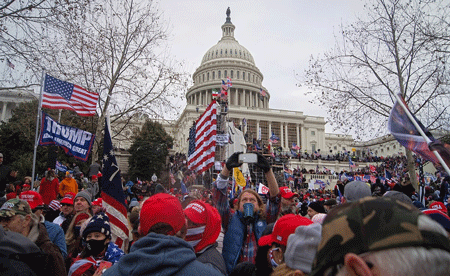Is civil war on the horizon? How bad could it get?
With polarization at a dangerous high, is the United States facing a second civil war? Center director Jeffrey Cole digs in.
By Jeffrey Cole

The January 6, 2020 Capitol attack. Credit here.
In just the past three months, political tensions have moved perilously close to the breaking point. The Red and Blue visions of what America should be have become even more divided. The Supreme Court’s Dobbs decision banned a constitutional right to abortion. For now, a woman can exercise a right in California or New York that could lead to a felony conviction or forced delivery of a pregnancy (under all circumstances) in the South. The lawful search of Mar-a-Lago to recover classified documents has already put the Department of Justice and the FBI on the enemies list for some Americans.
And, in the past week, to score political gains and photo opps in conservative media, the governors of Florida and Texas have transported (at state expense) migrants crossing the border to deep Blue places like Martha’s Vineyard and the front of the Vice-President’s residence in Washington, D.C. in order to “own the libs!”
Both sides are now openly frightened about what could happen if Donald Trump is indicted. One side demands it. The other considers it the product of a personal vendetta and a broad overreach of Federal power. This is yet another example of looking at the same thing and seeing something completely different based on which tribe we belong to.
The country will not face the possibility of an indictment and its fallout for another two months due to the precedent of not making a decision with such enormous political reverberations within two months of a national election. Had James Comey, director of the FBI at the time, honored such a moratorium in 2016, there might not be a former-President Donald Trump.
An indictment of a former president (common in Europe, Israel, and much of the world) might well be the thing that fully unleashes our pent-up anger and leads to violence. If the Proud Boys have been “standing by,” then this is why.
Looking back years from now, we might see January 6, 2021, as the dress rehearsal for what may be coming.
Trump clearly wants people to be frightened of what could happen. On the September 15th episode of Hugh Hewitt’s show, when he was asked what would happen if he were indicted, Trump predicted (or wished), “I think you’d have problems in this country the likes of which perhaps we’ve never seen before. I don’t think the people of the United States would stand for it.”
Close Trump ally Senator Lindsay Graham predicted a prosecution (not even a conviction) would lead to “riots in the streets.”
A Second Civil War?
Many on both sides believe a second Civil War is coming. For the first time in 161 years, Americans might openly declare war on one another.
A YouGov poll taken two weeks before the search of Mar-a-Lago showed that 43% of all voting-age Americans and 54% of all Republicans think it is at least somewhat likely a Civil War is on the horizon.
Some feel the Civil War is already here. On her MSNBC Show, host Tiffany Cross shared, “these days, it feels like we are not just at the brink of a Civil War, but that one has already begun.”
She is right that tensions have not been this high for generations, and hostility is starting to break into the open. Days after the Mar-a-Lago search, a 42-year-old Trump supporter held the Cincinnati field office of the FBI hostage until he was shot and killed by authorities.
Something awful and violent is likely to happen, but it is not Civil War. Not even close.
The tensions that led to the Civil War in 1861 had been brewing for generations. They rose as the country debated whether it could live in a nation of both free and slave states. The Missouri Compromise of 1820 and the 1850 Compromise kept the peace a little longer. Abolitionists, especially zealots like John Brown, made it clear the status quo could not last forever. It was the election of Abraham Lincoln, who fervently opposed the expansion of slavery, that led the South to open rebellion.
While the tensions are as high as then, nothing like that can or will happen today.
The Civil War was a major military conflict in which two massive armies opposed each other.
Well-trained generals led both Armies. Robert E. Lee, an officer of the United States Army who left to command the Confederate Army, was educated at West Point. The Union had a battery of equally prepared but unsuccessful generals, until Lincoln found Ulysses S. Grant. Grant had also trained at West Point. When some called for the removal of Grant, Lincoln replied, “I can’t spare this man—he fights.”
The lawful search of Mar-a-Lago to recover classified documents has already put the Department of Justice and the FBI on the enemies list for some Americans. And, in the past week, to score political gains and photo opps in conservative media, the governors of Florida and Texas have transported (at state expense) migrants crossing the border to deep Blue places like Martha’s Vineyard and the front of the Vice-President’s residence in Washington, D.C. in order to “own the libs!” Both sides are now openly frightened about what could happen if Donald Trump is indicted.
The major battles of the Civil War (Antietam, Gettysburg, and others) were massive conflicts between two well-equipped and, early on, evenly-matched armies. In the first few years the outcome was by no means assured.
In the Second Civil War of 2022 (or 2023, or 2024), there are not two-evenly matched armies. There are not leaders on both sides who were trained for leadership at the United States Military Academy.
On the one side is the U.S. Army, Navy, Marines, Air Force, National Guard and Coast Guard. Their leadership is highly professional and well trained.
On the other side are the Proud Boys, Oath Keepers, white supremacists, outcasts, true believers, and fanatics, some trained in the military as well. While they have access to military-grade weapons, especially automatic and semi-automatic guns, they lack tanks, missiles, and all the other weaponry of the U.S. military.
There will not be a battle between these two mis-matched armies. It would be over in a matter of minutes.
There will not be mass casualties anything like the 50,000 killed or injured in three days at Gettysburg (with a nation one-tenth as large as it is today).
Civil War is not coming.
But what is coming may last much longer.
The angry mobs supporting the former President will never coalesce into a unified fighting force. That would be easy to defeat. Instead, they will become guerrillas, ambushing political leaders and others they blame for what they feel is wrong in their world.
Assassinations could become the norm. Leaders at all levels of government will need more security. Some of the guerrillas may target schools, churches, synagogues, or other public places.
It might take years to put an end to all this.
These fighters will only be able to thrive by becoming terrorists.
That is the threat.
The good news is that there will not be another Civil War. That’s a myth. We will not see two American Armies converging on a battlefield. We will not lose two percent of the population.
The bad news is that a period of great anger, instability, and violence is not a myth. It’s dangerous and likely.
____________

Jeffrey Cole is the founder and director of The Center for the Digital Future at USC Annenberg.
See all columns from the center.
September 21, 2022

